A noisy garage door can be a nuisance, disrupting the peace and quiet of your home and potentially causing friction with neighbors. Fortunately, there are several effective methods to quiet a noisy garage door and restore tranquility to your living space.
From simple lubrication of moving parts to more advanced techniques like installing noise-reducing hardware, addressing the source of the noise can lead to a smoother and quieter operation.
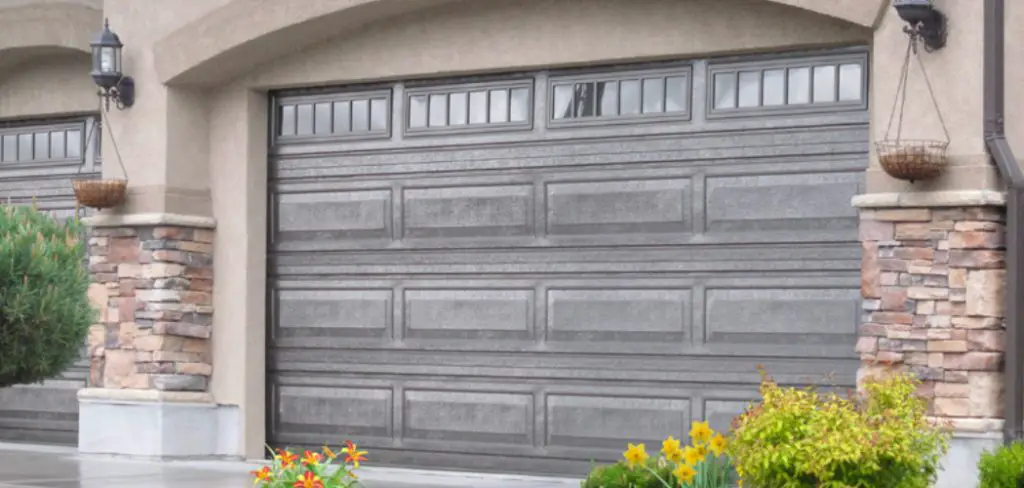
In this article, we’ll explore a variety of tips and techniques on how to quiet a garage door and enjoy a more peaceful environment. Whether you’re dealing with squeaky hinges, rattling tracks, or a loud motor, these methods will guide you toward a quieter garage door and a more harmonious home.
Introduction to Noisy Garage Doors
Noisy garage doors are more than just a minor inconvenience; they can be the symptom of underlying issues that, if left unaddressed, may lead to more significant problems down the line. The origins of garage door noise are diverse, ranging from natural wear and tear to improper installation or lack of maintenance.
Identifying the specific cause of the noise is the first step towards finding a suitable solution. Common culprits include loose hardware, misaligned tracks, worn out rollers, or insufficient lubrication of moving parts.
Beyond the mechanical aspects, the type of door opener and its condition can also play a crucial role in the level of noise produced. Understanding these factors is essential for any homeowner looking to reduce the racket and maintain their garage door’s health and longevity.
Importance of Quieting a Garage Door
Quieting a garage door goes beyond merely improving the auditory ambiance of your home. A quieter door significantly contributes to reducing stress levels and enhancing the overall peacefulness of your living environment. For households with members working odd hours or babies who are easily disturbed, a noisy garage door can disrupt sleep patterns and daily routines.
Furthermore, a noisy door often signals underlying mechanical problems, which, if ignored, could lead to costly repairs or even replacement in the future. Addressing noise issues promptly not only extends the lifespan of your garage door but also improves safety.
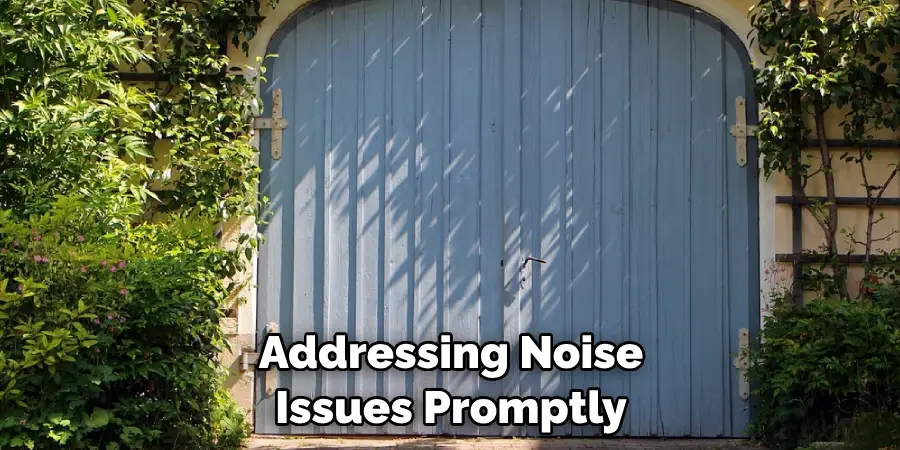
A smooth, quiet operation ensures that the door functions as intended, minimizing the risk of accidents or failures. Therefore, taking steps to quiet a noisy garage door is an investment in your home’s functionality, safety, and the well-being of its occupants.
Understanding the Causes of Noisy Garage Doors
The root causes of noisy garage doors are often linked to a variety of mechanical and environmental factors. One of the most common sources of noise is the age and condition of the door’s moving parts.
Over time, rollers can become worn or misshapen, hinges may corrode, and springs can lose their tension, leading to increased vibration and noise during operation. Additionally, the alignment of the garage door tracks plays a critical role in the smoothness and noise level of the door’s movement. Tracks that are bent or improperly installed can cause the door to jerk or stutter, creating additional noise.
Another significant contributor to garage door noise is the type of door opener used. Chain-drive openers, while durable and cost-effective, tend to be noisier than belt-drive or direct-drive models. Environmental factors, such as humidity and temperature changes, can also affect the metal components of the door, causing them to expand and contract. This can lead to misalignment and increased friction among parts, resulting in noise.
Lack of regular maintenance is a key factor that can exacerbate noise issues. Without periodic lubrication, cleaning, and adjustment, the door’s components can become increasingly noisy and less efficient. Understanding these potential causes of noise is the first step in diagnosing and addressing the issue effectively, ensuring a quieter and more reliable garage door operation.
Identifying Common Sources of Garage Door Noise
To effectively address and reduce garage door noise, it’s crucial to pinpoint the common sources contributing to the problem. Identifying these sources not only facilitates targeted solutions but also prevents the likelihood of future issues. Here are some of the most prevalent causes of garage door noise:
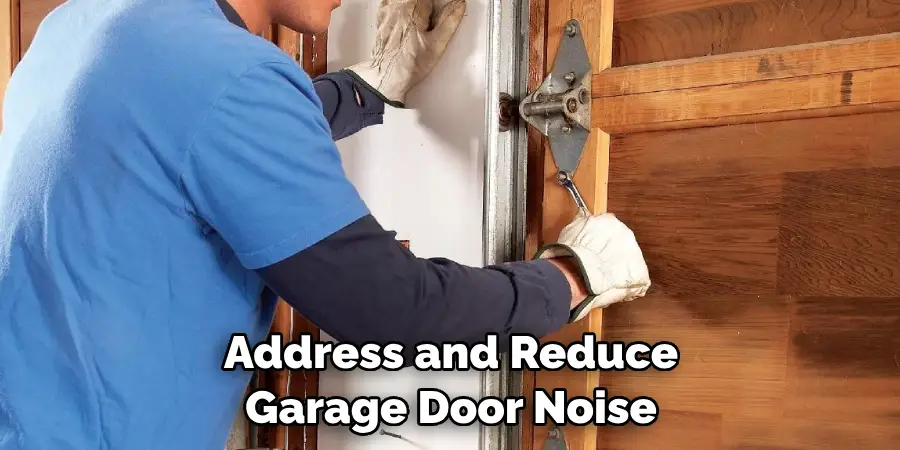
- Worn or Damaged Rollers – Metal rollers can become worn or rusted over time, and plastic rollers can crack or break, leading to increased noise during door operation. Replacing old rollers with nylon ones can significantly reduce noise and provide smoother operation.
- Loose Hardware – The vibration of daily garage door operations can loosen screws and bolts. This not only contributes to noise but can also affect the door’s stability and safety. Regularly checking and tightening loose hardware is a simple step toward a quieter door.
- Unlubricated Moving Parts – Lack of lubrication causes increased friction among the moving parts of the garage door, such as the rollers, springs, and hinges. This friction is a common source of noise. Applying a silicone-based lubricant to these parts can greatly reduce the noise.
- Misaligned Tracks – Garage door tracks that are not properly aligned can cause the door to move unevenly, creating noise. Ensuring that the tracks are perfectly aligned and securely fastened can help minimize noise.
- Old or Stretched Springs – The torsion springs and extension springs are crucial for balancing and lifting the door. Over time, these springs can wear out or stretch, leading to vibration and noise. Replacing old springs is recommended for noise reduction and safety.
- Garage Door Opener – The type and condition of your garage door opener play a significant role in the amount of noise produced. Chain-drive openers are typically noisier than belt-drive or direct-drive models. If the opener is the source of noise, consider upgrading to a quieter model.
By systematically checking these common sources, homeowners can identify the specific causes of their garage door noise and take appropriate measures to diminish it. This proactive approach not only ensures a quieter operation but also contributes to the longevity and efficiency of the garage door system.
Factors Contributing to Loud Garage Door Operation
Several factors can amplify the noise level of a garage door, turning what should be a smooth operation into a loud, disruptive event. It’s important to understand these contributing factors to effectively address and mitigate garage door noise. These include:
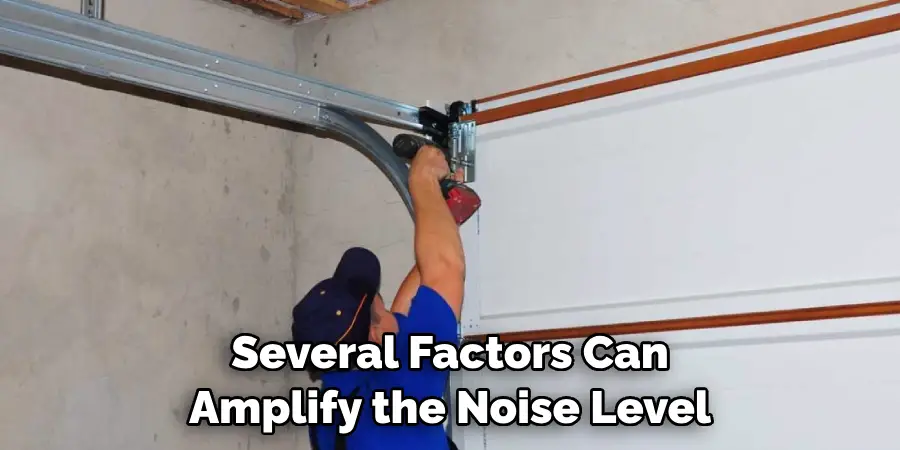
- Improper Installation – A garage door that has been incorrectly installed can lead to a host of problems, including excessive noise. Incorrect spacing, alignment errors, and improper balancing can make the door operate louder than it should.
- Type of Garage Door Material – The material of the garage door itself can influence the level of noise produced. Metal doors, for example, may echo and amplify sounds, especially if they are hollow. Insulated doors or those made of quieter materials may reduce noise.
- Old or Faulty Door Openers – An aging or malfunctioning garage door opener can be a significant source of noise. Older models, especially those that have not been properly maintained, tend to operate louder than newer, more advanced units.
- Environmental Conditions – External factors such as wind, rain, and temperature fluctuations can affect how a garage door operates. For instance, metal components may contract in cold weather, making the door noisier when it moves.
- Lack of Insulation and Sealants – A garage door lacking adequate insulation can not only be noisy but can also allow sound to travel more freely into the house. Proper sealing and insulation can help dampen the noise generated during operation.
By addressing these factors and ensuring that your garage door is correctly installed, properly maintained, and adequately insulated, you can significantly reduce the noise it makes. This enhances not only the peacefulness of your living environment but also the functionality and lifespan of the garage door system itself.
The Importance of Diagnosing the Root Cause of Garage Door Noise
Identifying the root cause of garage door noise is a vital step towards achieving a quiet and efficiently functioning system. Diagnosing the specific issue allows homeowners to apply targeted solutions, rather than resorting to temporary fixes that do not address the underlying problem.
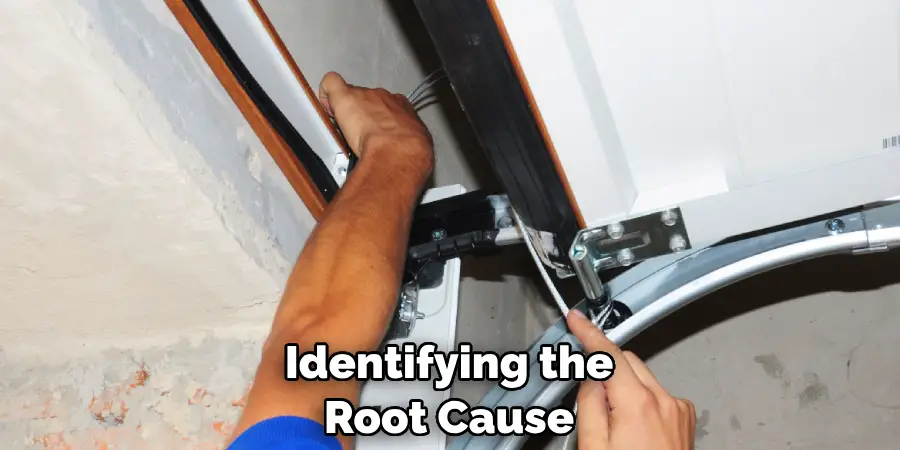
Understanding whether the noise originates from worn components, lack of maintenance, environmental effects, or improper installation is essential in selecting the appropriate remedy. This not only ensures that repairs are effective and cost-efficient but also helps in preventing potential safety hazards.
For example, noise stemming from worn-out springs could indicate a risk of sudden failure, posing a danger to both people and property. Additionally, pinpointing the exact cause can extend the lifespan of the garage door system by preventing further damage to its components.
In summary, accurately diagnosing the root cause of garage door noise is crucial for maintaining the system’s integrity, safety, and quiet operation.
10 Methods How to Quiet a Garage Door
1. Lubricate Moving Parts:
One of the simplest and most effective ways to quiet a garage door is by lubricating its moving parts. Apply a silicone-based lubricant to the hinges, rollers, tracks, and springs to reduce friction and noise during operation.
Be sure to clean off any dirt or debris before applying lubricant for optimal results. Additionally, regular lubrication can help extend the lifespan of your garage door. While this may not completely eliminate noise, it can significantly reduce it.
2. Tighten Loose Hardware:
Oftentimes, the source of garage door noise can be loose hardware such as nuts, bolts, and screws. Inspect the entire door system and tighten any loose hardware using a wrench or screwdriver.
This will help eliminate rattling and vibrations that contribute to the noise. While carrying out this task, ensure that all components are properly aligned. Though it may seem like a minor issue, loose hardware can cause bigger problems if not addressed in a timely manner.
To prevent loose hardware from becoming an ongoing problem, it is recommended to regularly inspect and tighten all hardware on your garage door. This should be done at least once every six months or more frequently if you notice any new noises or vibrations.
In addition to tightening loose hardware, it is also important to replace any damaged or worn out hardware. Over time, nuts, bolts, and screws can become stripped or corroded, making them less effective in holding the garage door together. By replacing these components as needed, you can ensure that your garage door operates smoothly and quietly.
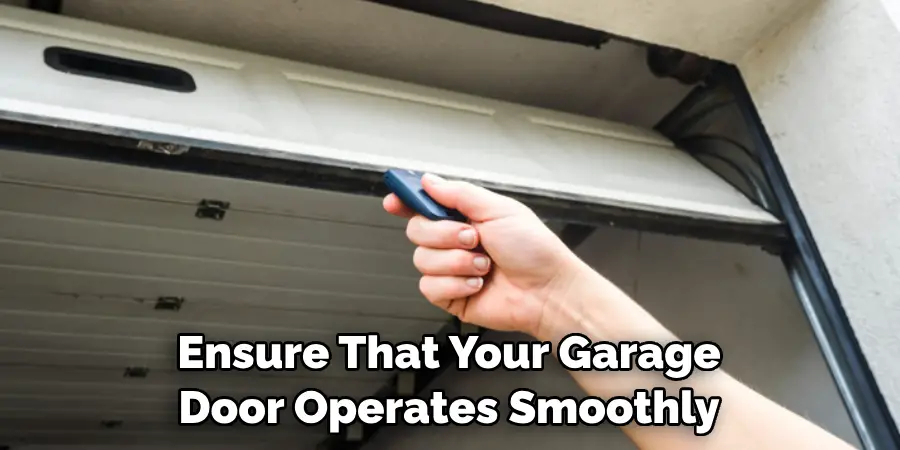
3. Replace Worn Rollers:
Worn or damaged rollers can cause excessive noise as they move along the tracks. Inspect the rollers for signs of wear, such as cracks or chips, and replace them if necessary. Consider upgrading to nylon or rubber rollers, which are quieter than traditional metal ones.
Rollers are an important part of your garage door system, helping the door move smoothly along the tracks. Over time, they can become worn or damaged due to constant use and exposure to various elements. This can result in increased noise levels and even affect the overall functionality of your garage door.
4. Install Nylon Bushings:
Installing nylon bushings in the hinges can help reduce friction and noise during door operation. Simply remove the existing metal bushings from the hinges and replace them with nylon ones. This simple upgrade can make a significant difference in the overall noise level of your garage door.
Nylon bushings are also a great option for those looking to reduce wear and tear on their garage door hinges. Due to their smooth surface, they can help minimize friction between the hinge and the roller, prolonging the life of both components. Furthermore, nylon is resistant to weathering and corrosion, making it a durable choice for long-term use.
5. Check and Adjust Track Alignment:
Misaligned tracks can cause the garage door to make loud scraping or rubbing noises as it moves. Use a laser level to check the alignment of the tracks and adjust them as needed. Loosen the track mounting bolts, gently tap the tracks into alignment, and then tighten the bolts back in place.
If the tracks cannot be adjusted, it may be necessary to replace them. While adjusting the tracks, also check for any debris or buildup that may be causing additional friction.
6. Install a Noise-Reducing Bottom Seal:
The bottom seal of the garage door can often be a source of noise, especially if it’s worn or damaged. Replace the seal with a noise-reducing bottom seal made of rubber or vinyl. This will help create a tighter seal and reduce the amount of noise entering or exiting the garage. Though seals made of materials such as rubber and vinyl are effective in reducing noise, there are additional steps that can be taken to further minimize sound.
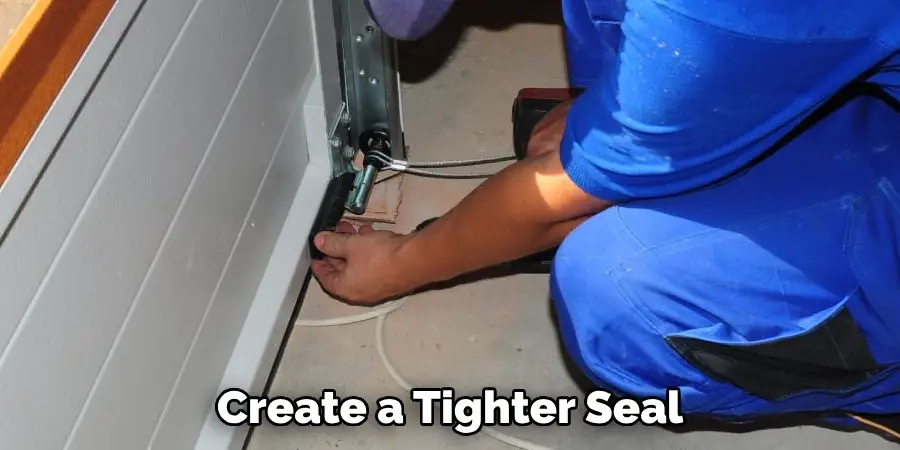
One option is to install a dual-component bottom seal. This type of seal has two layers – one for sealing and one for insulation. The inner layer provides a tighter seal while the outer layer helps to reduce noise. This combination can significantly decrease the amount of noise coming from your garage door.
Another option is to use acoustic insulation panels or foam strips on the inside of the garage door. These materials are designed specifically for soundproofing and can greatly reduce the noise level in and out of the garage. They can be easily attached to the inside of the door with adhesive or clips, providing a simple yet effective solution.
7. Apply Soundproofing Material:
If your garage door is particularly noisy, consider applying soundproofing material to the inside of the door panels. Soundproofing foam or insulation can help absorb sound waves and reduce the overall noise level of the door. Apply the material to the back of the door panels using adhesive for best results. You can also add weather stripping or rubber seals to the edges of the door to help prevent sound from escaping.
8. Install Anti-Vibration Pads:
Anti-vibration pads can help reduce the amount of noise generated by the garage door opener motor. Place the pads under the motor or mounting brackets to dampen vibrations and minimize noise. Make sure to choose pads designed specifically for garage door openers for optimal effectiveness.
9. Replace the Garage Door Opener:
If your garage door opener is old or outdated, it may be contributing to the noise problem. Consider replacing it with a newer, quieter model equipped with features like belt-driven operation and soft start/stop technology. This can significantly reduce the noise level of your garage door system.
10. Schedule Professional Maintenance:
Regular professional maintenance can help keep your garage door operating smoothly and quietly. Schedule a maintenance appointment with a qualified technician who can inspect and lubricate all moving parts, check for worn or damaged components, and make any necessary adjustments to ensure optimal performance.
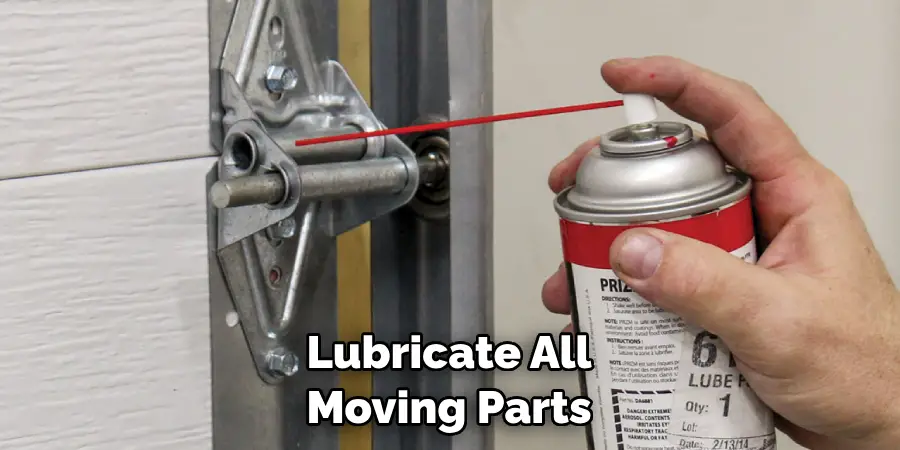
Conclusion
In conclusion, quieting a garage door is not only about reducing noise but also about enhancing the overall comfort and functionality of your home. By following the comprehensive guide provided in this article, homeowners can address noisy garage door issues effectively and enjoy a quieter living space.
Whether through regular maintenance, upgrading to noise-reducing hardware, or implementing soundproofing strategies, there are various approaches to achieve a quieter garage door operation.
Remember, prioritizing proactive maintenance and seeking professional assistance when needed can significantly contribute to the success of your noise reduction efforts. Thanks for reading, and we hope this has given you some inspiration on how to quiet a garage door!
